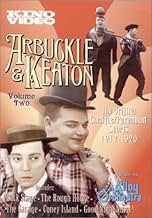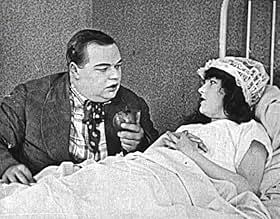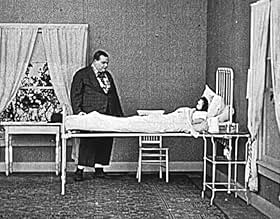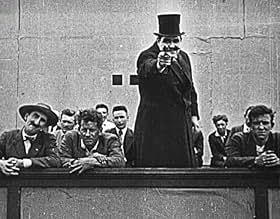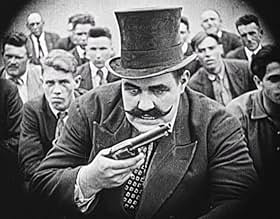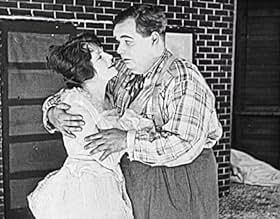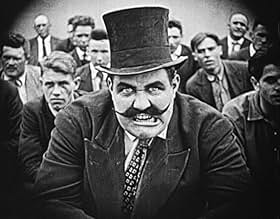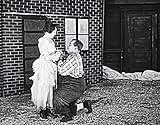Ajouter une intrigue dans votre langueWorking their fingers to the bone to prepare the set for an upcoming performance, the enthusiastic stagehands, Roscoe and Buster, find themselves on stage when the cast quits. However, is wi... Tout lireWorking their fingers to the bone to prepare the set for an upcoming performance, the enthusiastic stagehands, Roscoe and Buster, find themselves on stage when the cast quits. However, is will alone enough to earn a big round of applause?Working their fingers to the bone to prepare the set for an upcoming performance, the enthusiastic stagehands, Roscoe and Buster, find themselves on stage when the cast quits. However, is will alone enough to earn a big round of applause?
- Réalisation
- Scénario
- Casting principal
Avis à la une
Arbuckle and Keaton are stage hands getting ready for the upcoming show's star performer, a strongman who turns out to be very abusive toward his female assistant. Well before the 'Me-Two' Movement, the pair take it upon themselves to set the larger man straight. Because no one treated him like that before, he refuses to go on the stage. So Arbuckle and company decide to improvise the entertainment, much to the delight of the sell-out crowd. Trouble is, Mr. Muscleman doesn't appreciate their act.
A notable sequence shows one of the stage set's large false wall designed as a side of a house collapsing onto Arbuckle, who is standing underneath it. Thankfully, an open window frame on the second floor falls directly on top of him, allowing Fatty to escape without a scratch. Keaton remembered that trick and used it twice in his movies when he went solo, most famously in 1928's 'Steamboat Bill, Jr.'
The darkness in the comedy is ironic, because by bosom buddy Buster Keaton's account, in real life "Arbuckle was that rarity, a true jolly fat man. He had no meanness, malice, or jealousy in him. Everything seemed to amuse and delight him. He was free with his advice and too free in spending and lending money. I could not have found a better-natured man to teach me the movie business, or a more knowledgeable one. We never had an argument."
Fresh off being away for nearly a year in the army, Keaton stayed loyal to Arbuckle despite offers for significantly more money elsewhere. Change was in the wind for Arbuckle, however, as he had changed studios and lost many of the other people in his ensemble, including Alice Lake and (very soon) even nephew Al St. John, who barely appears here. Arbuckle was ill during production, delaying it, and perhaps all of these things led to a rather average film. This was a year before he would sign a mega-contract with Paramount, and two years before the Virginia Rappe scandal would unfairly ruin him.
There are some of the old Arbuckle standbys, including him and Keaton dressing up in drag and dancing, not much of which is very inspired. The limber (and likely coded gay) dancer John Coogan (Jackie's father) does the splits and various maneuvers both Arbuckle and Keaton try to follow, which was amusing. One of the funnier bits was an early version of a sign changing message when a portion of it is concealed, when a posting goes from "Gertrude McSkinny famous star who will play the little laundress first time here tomorrow at 2 pm" to the decidedly more ribald "Miss Skinny will undress here at 2pm."
The best, however, was the bit with the wall of a stage set falling down and just missing Arbuckle, who happens to be standing where one of the window cutouts is. Keaton of course would use this to much more dramatic effect in Steamboat Bill, Jr nine years later, and it was pretty cool to see this early version. Between this and the early version of Chaplin's bread roll dance in The Rough House (1917), you can really see the influence Arbuckle had on these giants of comedy, and his own place alongside them.
The setting, with Fatty and Buster working "Back Stage" for a vaudeville show, lends itself well to humor and variety, and this setting is quite interesting in its own right. If you watch closely, you'll also notice a number of gags used here that Keaton later refined and used to even greater effect later in some of his own short features.
There are several good sequences, and they provide a good showcase for both Arbuckle and Keaton to display their considerable array of comic talents. Al St. John and the rest of the supporting cast also get a couple of good moments. It's great comedy, and a lot of fun to watch.
Like Keaton's later short, "The Play-House" (1921), this two-reel comedy gives viewers a distinct feel for the era of vaudeville--though from the perspective of the stagehands rather than the audience. It includes many fine gags built around various back-stage activities and the bumbling attempts of two stagehands, Arbuckle and Keaton, to act as performers.
The most interesting gag historically involves a scenery flat falling toward Arbuckle, with an upstairs window passing around him. Keaton later used an actual falling house front in the same manner twice in his own films: the 1920 short "One Week" (his first release as a solo artist) and, more dramatically, in the 1928 feature "Steamboat Bill Jr.," which was his last independent release (it does not appear in "Sherlock Jr." as stated elsewhere). The latter instance was an extremely dangerous stunt, which easily would have killed Keaton if he did not hit his mark precisely.
"Back Stage" is not their best film together, but it remains a very good Arbuckle-Keaton effort well worth viewing.
Le saviez-vous
- AnecdotesIncluded in "Buster Keaton: The Shorts Collection" blu-ray set, released by Kino.
- Citations
Strongman's Assistant: [the act quits, to Buster and Fatty] We don't need them. Let's do the show ourselves!
- ConnexionsFeatured in Birth of Hollywood: Épisode #1.2 (2011)
Meilleurs choix
Détails
- Durée
- 26min
- Mixage
- Rapport de forme
- 1.33 : 1

